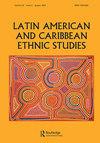A taste for ecology: class, coloniality, and the rise of a Bolivian urban environmental movement
IF 0.6
Q4 ETHNIC STUDIES
引用次数: 1
Abstract
ABSTRACT Since at least the mid-20th century, social movements have been key actors in Bolivian society, causing governments to fall and redrawing the cartographies of power. Recently, a new movement emerged, a middle-class movement that articulated its demands in harsh opposition to the government of former President Evo Morales: an urban environmental movement. In its rhetoric, Morales was un burro (a donkey) and un ignorante (an ignorant man) steering the country towards ecological collapse. Subsequently, the movement played a key role in the social protests that led to Morales’s fall in November 2019. In this paper, I aim to understand why this movement emerged and mobilized during the Morales administration and how colonially conditioned relations of power and contradictory images of the indigenous Other are articulated in this process. I argue that the emergence and mobilization of the movement ought to be understood in relation to: (1) the politically conditioned forms for legitimate political opposition; and (2) the challenge to coloniality implied by the coming to power of subalternized subjects. When the borders of seemingly fixed categories and spaces are blurred, the privileged develop novel ways of making social distinctions. One such way, I argue, is to display a ‘taste for ecology.’对生态的品味:阶级、殖民和玻利维亚城市环境运动的兴起
摘要至少自20世纪中期以来,社会运动一直是玻利维亚社会的关键参与者,导致政府倒台,重新绘制权力地图。最近,出现了一场新的运动,一场中产阶级运动,强烈反对前总统埃沃·莫拉莱斯的政府,提出了自己的要求:一场城市环境运动。在其修辞中,莫拉莱斯是一头驴,也是一个无知的人,引导国家走向生态崩溃。随后,该运动在导致莫拉莱斯于2019年11月倒台的社会抗议活动中发挥了关键作用。在这篇论文中,我的目的是了解为什么这场运动在莫拉莱斯政府期间出现并动员起来,以及殖民制约的权力关系和土著他者的矛盾形象是如何在这个过程中表达出来的。我认为,应该将该运动的出现和动员理解为:(1)合法政治反对派的政治条件形式;以及(2)下层臣民掌权所隐含的对殖民主义的挑战。当看似固定的类别和空间的边界变得模糊时,特权阶层就会发展出新的社会区分方式。我认为,其中一种方式是展示“对生态的品味”
本文章由计算机程序翻译,如有差异,请以英文原文为准。
求助全文
约1分钟内获得全文
求助全文
来源期刊

Latin American and Caribbean Ethnic Studies
Social Sciences-Cultural Studies
CiteScore
1.30
自引率
16.70%
发文量
22
 求助内容:
求助内容: 应助结果提醒方式:
应助结果提醒方式:


